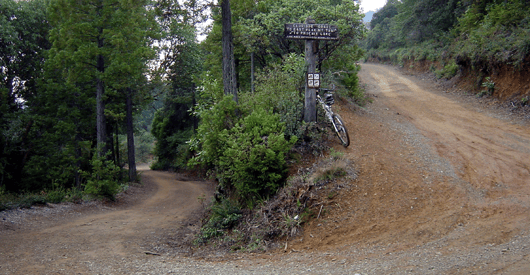
I took up mountain biking in middle age. I didn’t have the feeling of invulnerability that the young guys I rode with had. I studied books and videos to learn biking techniques and skills I would need to ride the trails around my northern California home.
There was one piece of advice that puzzled me. Writers pointed out that “your bike tends to go where you’re looking,” so it’s wise to look where you want to go, not where you don’t want to go.
Sounds good. Of course you want to do that. Turns out it’s a lot harder than it sounds.
I’d find myself perched way back on my saddle, tearing down a twisty trail, staying to one side of a foot-deep rut that runs down the middle of the trail. At the bottom of the downhill there’s a large bounder, or maybe a log. As I’m riding, my eyes are locked on the obstacle, the thing I want to avoid. I feel like I have to keep watching it or the disaster it represents will grab me.
Of course, since I’m concentrating on the log, my bike starts drifting toward it. Sometimes I end up learning this lesson sitting on my butt, dazed and dusty and wondering if I’ve bent a rim when I hit the log.
One day it connected. Ah, I thought to myself, the idea is to look right next to the log, where I want my tires to go. Could I do that? Next ride out, I made sure to try. I wrenched my gaze away from a pyramid of stone in the middle of a trail I was riding, and looked instead at the dirt right next to the stones. Sure enough, my bike just slipped past, smooth and serene.
Was my problem solved just like that? Not quite. The tendency to focus on the obstacle, rather than the route around the obstacle, came back to bite me lots of times before I learned this lesson.
The Law of Attraction for Skeptics
You can see this same principle at work in day to day life. It’s a kind of physical analogy to the supposed Law of Attraction, where you attempt to use your imaginative powers to bring the things you want into your life.
But how capable are we of concentrating on the outcome we want, instead of being overwhelmed by the obstacles we see in front of us?
Maybe you’ve got a deadline that seems impossible. Maybe your best client hasn’t returned your calls in two days. It doesn’t matter, you focus on the obstacles, the things that look like that could stop you cold.
We’re so convinced we have to “work” on the problem, or “study” it, when it’s just our fear that keeps us glued to what might turn into a disaster.
Instead, I think many successful people keep their eye on how to navigate around, over or through those obstacles. They focus on solutions, not problems. I can’t say whether they “attract” success, or cause it by their actions. But is there really that much difference between the two, if you end up in the same place at the end?
Take a tip from an old mountain biker: When you see an obstacle pop up on the trail in front of you, start looking for the path around it. You’re much more likely to find a positive outcome on the other side of the trail.


